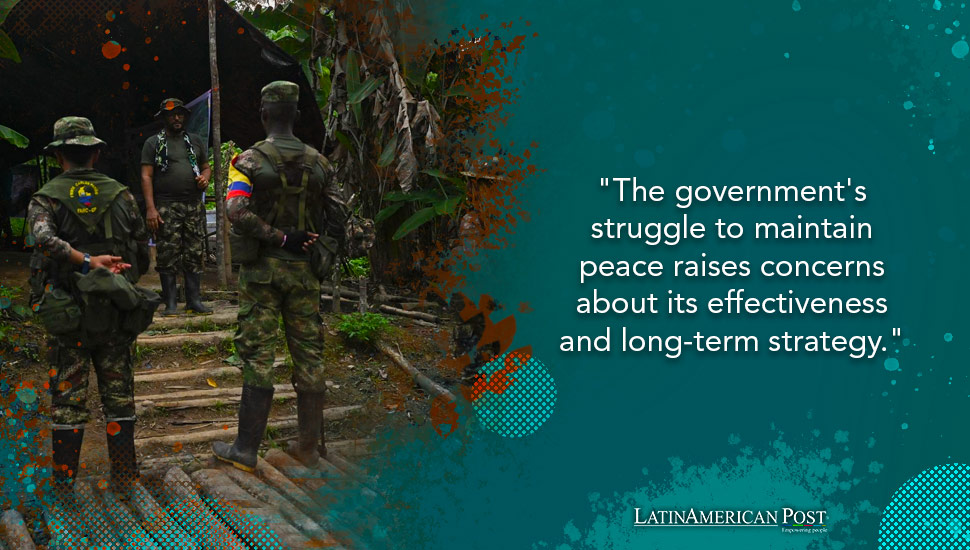Colombia’s Peace Process Faces Severe Setbacks Amid Escalating Violence

Colombian President Gustavo Petro’s recent order to halt the ceasefire with the FARC dissidents reflects a faltering peace process as violence intensifies in the southwest. The government’s struggle to maintain peace raises concerns about its effectiveness and long-term strategy.
The recent decision by Colombian President Gustavo Petro to ceasefire with the Estado Mayor Central (EMC), the primary dissident faction of the FARC, underscores the deteriorating security situation in the southwest of the country. This move, prompted by an escalation of violence, highlights the significant challenges facing the government’s peace efforts.
The EMC, a prominent dissident faction of the FARC, has been at the center of increased violence in Colombia’s southwestern regions, particularly in the departments of Cauca, Nariño, and Valle del Cauca. The group’s activities have included attacks on police stations, bombings, and clashes with government forces, resulting in numerous casualties and widespread insecurity.
In response to this violence, President Petro ordered the cessation of the ceasefire with the EMC and directed a focus on dismantling the group’s illicit economic activities, such as drug trafficking and illegal mining. Colombian Defense Minister Iván Velásquez announced these measures after a security council meeting in Popayán, Cauca’s capital. He also offered a reward of 500 million pesos (approximately $130,000) for information leading to the capture of crucial EMC leaders and pledged to increase security forces in the region.
Challenges in Peace Negotiations
The suspension of the ceasefire marks a significant setback in the peace process. The dialogue with the EMC has been fraught with difficulties, exacerbated by internal divisions within the dissident group. The EMC’s split into factions, with some of the most violent groups excluded from negotiations, has stalled progress. This division has led to fragmented leadership and inconsistent adherence to peace agreements, further complicating efforts to achieve a lasting peace.
Historical Context: Colombia’s Struggle for Peace
Colombia’s history of conflict is deeply rooted, with over five decades of civil war involving multiple armed groups, including the FARC, ELN, and various paramilitary organizations. The 2016 peace agreement with the FARC was a landmark achievement aimed at ending one of the longest-running conflicts in Latin America. However, the agreement’s implementation has faced numerous hurdles, including the emergence of dissident factions like the EMC that rejected the terms of the peace deal.
The Colombian government has repeatedly attempted to negotiate peace with these dissident groups but with limited success. The recent surge in violence is a stark reminder of the fragile nature of these peace efforts and the complexities involved in addressing deeply entrenched conflicts.
Government Strategies and Community Impact
In addition to military measures, President Petro’s administration has emphasized the importance of socio-economic development in addressing the root causes of violence. The government plans to collaborate with local authorities in Cauca to implement infrastructure projects, including health centers, schools, and roads, to improve living conditions and reduce the appeal of illegal activities.
One key initiative is substituting coca crops with legal alternatives. The government aims to replace over 15,000 hectares of coca in the Micay Canyon and Argelia municipality. However, these efforts face significant challenges, including resistance from armed groups that profit from the drug trade and the logistical difficulties of implementing such programs in conflict zones.
Local Reactions and National Security
The situation in Cauca and surrounding areas has significantly impacted local communities. The recent attacks, including the bombing of a police station in Morales and a motorcycle bomb explosion in Jamundí, have heightened fears among residents. The violence has also disrupted daily life and economic activities, exacerbating the hardships the local population faces.
The government’s response, including increased military presence and targeted operations against the EMC, reflects a hardline approach to restoring security. However, these measures have drawn criticism for potentially escalating the conflict further and causing collateral damage. Critics argue that a more comprehensive strategy, integrating peacebuilding and community development, is essential for sustainable peace.
Broader Implications for Colombia’s Peace Process
The current situation raises broader questions about the effectiveness of Colombia’s peace process and the government’s ability to maintain control over regions plagued by armed conflict. The failure to fully integrate all dissident factions into the peace process has left significant gaps in security and governance, allowing violence to persist.
Moreover, the international community, which has supported Colombia’s peace efforts, closely watches these developments. Continued violence and instability could undermine global confidence in Colombia’s ability to achieve lasting peace and secure much-needed foreign aid and investment.
President Petro’s decision to halt the ceasefire with the EMC reflects the severe challenges facing Colombia’s peace process. The escalation of violence and the failure to establish a stable dialogue with dissident groups underscore the need for a more integrated and comprehensive approach to peacebuilding.
Also read: Colombia and EMCDDA Partnership Enhances Drug Policy Effectiveness
Addressing the root causes of conflict, including poverty, inequality, and illicit economies, is crucial for sustainable peace. The government must balance military measures with socio-economic development initiatives and community engagement to build trust and create conditions for lasting peace.
As Colombia navigates this complex and challenging landscape, the stakes are high. The success or failure of its peace process will have profound implications for the country’s future and the broader region. A renewed commitment to comprehensive peacebuilding, with the support of the international community, is essential for Colombia to move beyond its cycle of violence and achieve enduring stability.





